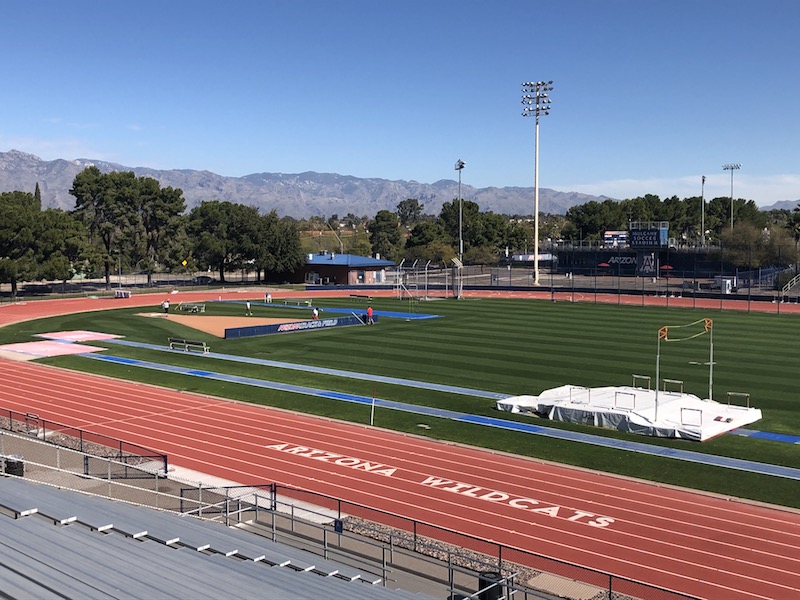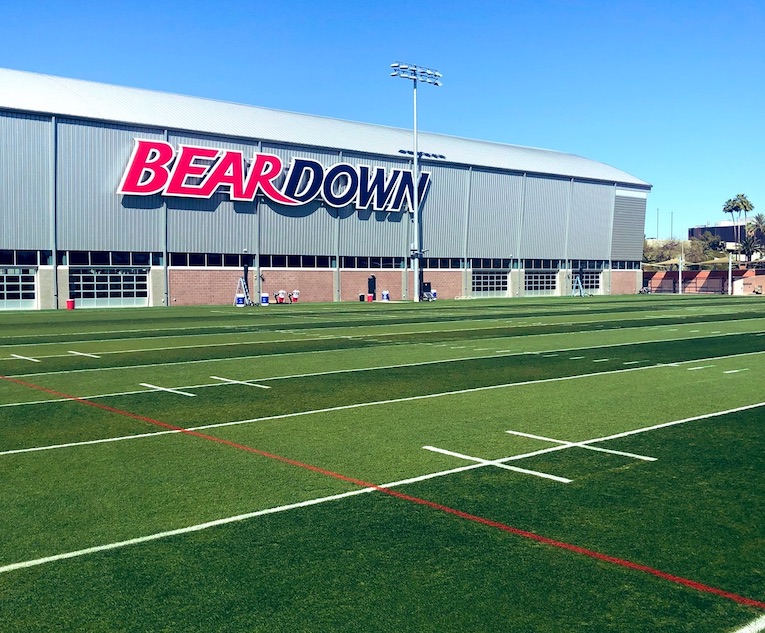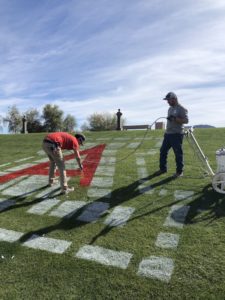In this edition of the SportsField Management Interview, we meet Darren Criswell, project manager – turfgrass at The University of Arizona.
SportsField Management (SFM): Please tell us about the fields/facilities you manage, and your staff/crew.
Criswell: My team and I oversee roughly 60 acres of turfgrass throughout the campus, rec fields and athletic fields. The crew is made up of myself, my assistant, Chico Guzman, and eight full-time employees, in addition to student workers.
We maintain our campus lawns daily, and I have assigned personnel to oversee the athletic fields on a day-to-day basis.
Our campus lawns have a lot of high-priority characteristics to them, due to the nature of our campus and the expectations of keeping it looking great year round for our students, potential students and the local community.

Our athletic fields consist of the usual and then the unique nature to them. We have our soccer, track and intramural facility located off campus about a mile away from the university. Then our baseball stadium and practice baseball field are a little less than three miles away from the university.
On campus, we have our football stadium, indoor practice facility, and intramural practice field, which are all synthetic. In addition, we have our practice football fields, softball field, beach volleyball courts, another practice field and an on-campus intramural facility.
SFM: What attracted you to the sports field management industry, and what was your path into the industry?
Criswell: I’ve always enjoyed sports as a kid, so when I was a senior in high school I got a part-time job at Peoria Sports Complex as a groundskeeper. It was there that I first learned I could make this part-time job into a profession. I moved around to another Spring Training facility and was encouraged to further my education at the University of Arizona. I interned/studied at the University of Arizona, gaining my B.S. in Agriculture
If it weren’t for some great mentors/bosses in my youth and at all my places of employment, I wouldn’t be the turf manager I am today. Having that exposure to teams that have a passion and knowledge really opened up my eyes to learning and wanting to do more. Having a foundation of great mentors is a huge bonus for me, I know I can just pick up the phone and give them the call no matter what. It’s truly great to see old bosses turn into lifelong friends, and for that I’ll always be grateful for becoming a turf manager.

SFM: Who are your mentors, and what is the best advice you received during your career?
Criswell: Matt Anderson, John Knight and Chico Guzman. They have helped shape who I am today. I’ve received a lot of good advice from these turf managers. Knight pushed me to further my education, telling me it is a vital piece to moving up in the industry. Anderson taught me what being a turf manager is, in relation to professionalism, standards and understanding everything in between. Guzman was a foundation for work ethic and team building.
SFM: What would you say are the biggest accomplishments of your career and/or what are you most proud to have achieved?
Criswell: On a personal note, growing through the turf industry is something I take a lot of pride in. From being the part-time groundskeeper to now running a university turf team, it is always nice for reflection.
There is no individual award/accolade that makes me feel any prouder than the recognition my crew can get. I’ve been very lucky to work with great people everywhere I have been – this past year we got an award for field of excellence, and that’s always nice to be recognized for. I personally would love to win a Field of the Year from STMA in the coming years, though!

SFM: What are the biggest challenges you have faced in your career, and what advice do you have for other sports field managers when it comes to facing similar challenges?
Criswell: Events, administration and building a team.
The first thing that comes to mind is putting out fires. Not literally, but within the turf industry we work around events. Doing this means we need to have a lot of flexibility, because so many other parties have their own agenda. I build a strong customer service base relationship with all our other operational departments, because I know their jobs are just as important as ours. If I can form a personable relationship, which then allows me to enlighten them on what our needs are, it makes for a much smoother sail.
Administration. Educating them and having an open-door relationship is key. They are the backbone to allowing us to get equipment, materials and all other needs to get the job done. The better relationship I’ve had in the past has made the job easier. I’m not saying there are never challenges, but making sure they are aware of them helps out tremendously.
Building a team. Having one goal in mind is what keeps a team united. The other aspects to managing are based off what I do as a leader because attitude is a reflection of leadership. Key in on an individual’s strengths and weaknesses, use these to help build your staff. Keep a positive attitude, but, overall, let your staff know you are human. A sense of humility goes far with guys that work so closely with you.
SFM: What are your passions and interests outside of work?
Criswell: I don’t have any certain one passion or interest. What I’ve taken from life is I like to have fun. So if it is something we can have fun doing, I’m more than happy to do it. Anything from playing video games with my friends to my girlfriend and I taking a spontaneous trip to Vegas, trying different drinks at restaurants – enjoying the time I have on this Earth, basically!

SFM: How has your career benefited from being a member of STMA?
Criswell: It has benefitted in two ways – the networking capabilities and the educational aspects. I’ve loved the networking aspect to it. I’ve created a lot of relationships with other sports turf managers. So networking has been huge, and then the educational aspects are great. Refreshing the brain on topics I haven’t seen in a while, or learning new methods, has become something I’ve really relied on.
SFM: How do you think the profession and industry will change in the next 10 years, and/or what would you most like to see in terms of industry advancement in the future?
Criswell: For the profession, I think it can only go up. We have become essential in this time, and I believe COVID helped highlight that. So I would like to see advancement within organizations, utilizing us and our knowledge to help bring a better product to the organization. I want the grounds departments to have a valued opinion. I think at least sitting at the table can help open eyes to new ideas, and being able to elaborate on new technologies or methods will help administrations all around understand we can be utilized in more ways than one.


